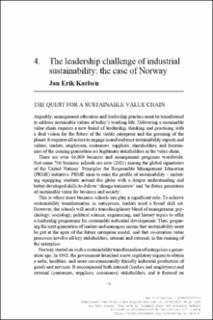| dc.contributor.author | Karlsen, Jan Erik | |
| dc.date.accessioned | 2024-04-10T09:46:16Z | |
| dc.date.available | 2024-04-10T09:46:16Z | |
| dc.date.created | 2023-11-09T08:06:06Z | |
| dc.date.issued | 2023 | |
| dc.identifier.citation | Karlsen, J. E. (2023). The leadership challenge of industrial sustainability: the case of Norway. In Practicing Responsibility in Business Schools (pp. 78-107). Edward Elgar Publishing. | en_US |
| dc.identifier.isbn | 9781035313167 | |
| dc.identifier.uri | https://hdl.handle.net/11250/3125753 | |
| dc.description.abstract | Arguably, management education and leadership practice must be transformed to address sustainable values of today’s working life. Delivering a sustainable value chain requires a new brand of leadership, thinking and practising with a dual vision for the future of the viable enterprise and the greening of the planet. It requires all actors to engage in and embrace sustainability aspects and values; leaders, employees, customers, suppliers, shareholders, and forerun- ners of the coming generation are legitimate stakeholders in the value chain. There are over 16,000 business and management programs worldwide. Just some 700 business schools are now (2021) among the global signatories of the United Nations’ Principles for Responsible Management Education (PRME) initiative. PRME aims to raise the profile of sustainability – includ- ing equipping students around the globe with a deeper understanding and better-developed skills to deliver ‘change tomorrow’ and ‘be future generators of sustainable value for business and society’. This is where more business schools can play a significant role. To achieve sustainability transformation in enterprises, leaders need a broad skill set. However, the schools will need a transdisciplinary blend of management, psy- chology, sociology, political science, engineering, and history topics to offer a leadership programme for sustainable industrial development. Thus, prepar- ing the next generation of leaders and managers means that sustainability must be put at the apex of the future enterprise model, and that co-creation value processes involve all key stakeholders, internal and external, in the running of the enterprise. | en_US |
| dc.language.iso | eng | en_US |
| dc.publisher | Edward Elgar Publishing | en_US |
| dc.relation.ispartof | Practicing responsibility in business schools : Implications for teaching, research, and innovation | |
| dc.rights | Navngivelse 4.0 Internasjonal | * |
| dc.rights.uri | http://creativecommons.org/licenses/by/4.0/deed.no | * |
| dc.title | The leadership challenge of industrial sustainability : The case of Norway | en_US |
| dc.type | Chapter | en_US |
| dc.description.version | publishedVersion | en_US |
| dc.rights.holder | The author | en_US |
| dc.subject.nsi | VDP::Samfunnsvitenskap: 200::Økonomi: 210 | en_US |
| dc.source.pagenumber | 78-107 | en_US |
| dc.identifier.doi | 10.4337/9781035313174.00015 | |
| dc.identifier.cristin | 2194302 | |
| cristin.ispublished | true | |
| cristin.fulltext | original | |
| cristin.qualitycode | 2 | |

